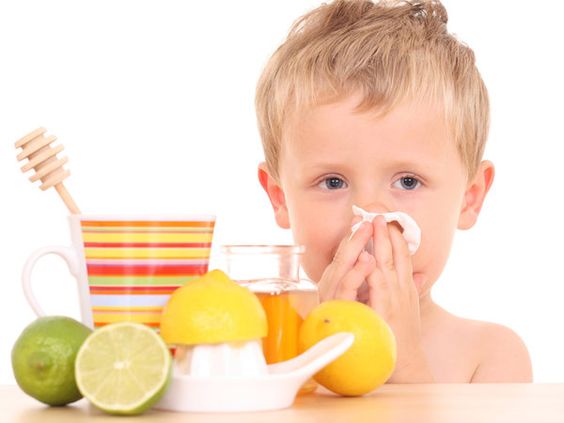10 Tips to Increase Your Child's Immune System

Many of the potential health problems that children face can be prevented by increasing their immune system. The body’s immune system can be helped in different ways, such as by eating a nutritious diet to ward off certain diseases.
The first food proven effective for this purpose is certainly breast milk. However, throughout infancy a child’s immune defenses can be diminished, perhaps due to a long illness or prolonged pharmacological treatment. The immune system can collapse as a result.
Likewise, certain traits related to the time of year have been identified, which make it possible for viruses to multiple. In other words, some viruses are more common in certain seasons, which is why it’s important to follow an even healthier diet during this time.
How to increase immune system

Some children need to raise their defenses because of particular health circumstances. In any case, however, it is interesting to know which foods provide the body with energy and help boost the immune system.
The Association of Families of Children with Cancer in Castilla la Mancha, otherwise known as AFANION, has published a series of dietary tips to promote increased immune defenses. These recommendations are based on the care given to children with special needs, such as cancer. As we know, these children suffer from an illness and a treatment that weakens them. Therefore, their diet should be refreshing.
You are as important to your health as it is to you.
-Terri Guillemets-
According to specialists, this type of diet is appropriate for anyone who needs to increase their immunity. It is not a risk when recovery is needed. It is essential for preventing contagion by fungi, bacteria and viruses. A healthy diet that contributes to the body’s natural recovery is worth a try.
Tips for increasing immune system

AFANION recommends the following dietary guidelines for increasing children’s immune system.
- Choose cooked versus raw foods. Sometimes we prefer a salad because we think it’s healthiest, but it’s convenient that we have a preference for porridge and soft, cooked foods.
- Avoid fruits that are eaten with the skin or are difficult to wash. Get used to having these foods come peeled, for example, bananas, oranges or tangerines.
- Avoid packaged juices or processed fruits.
- It is advisable to eliminate fresh cheese, Roquefort or blue cheese, ham and raw eggs from their diet.
- Pastries, sweets and cream are not recommended in this diet.
- Use only olive oil to cook and season food.
- Sterilization of food is highly recommended, so it is preferable to use a pressure cooker.
- Allow your child to have his own cutlery and dishes, with the idea that they don’t have to be shared with anyone else.
- Take care of hygiene regarding hands, utensils and cooking areas. Your child should wash his or her hands regularly.
- It is very important to be concerned about food preservation, to avoid contamination during defrosting and to avoid inadequate cooking.
- Include foods rich in probiotics, such as yogurts and fermented milks. Prebiotic fiber is also recommended, which can be found in foods such as onions, bananas or wheat.
- Natural fats, bread, rice, pasta, potatoes, legumes and vitamins A, E and D should not be lacking in the diet in order to increase immune defenses. Likewise, minerals such as zinc, iron and magnesium are also needed.
Other recommendations
The problem with having low immune defenses is that we can get sick easily if we don’t adjust our habits. To avoid possible illnesses while trying to increase immunity, the following should be taken into account:
- Maintain a balanced temperature and avoid sudden temperature changes.
- Make sure the child stays away from tobacco smoke
- Avoid exposure to viruses
- Spend about 10 minutes each day to ventilate the house
- Make sure your child gets a good night’s sleep, proper rest during the day and a nap
- Ensure exercise is not intense, but rather a moderate walk or physical activity
- The sun is an excellent source of vitamin D, so try to go out to sunbathe even in winter.
Many of the potential health problems that children face can be prevented by increasing their immune system. The body’s immune system can be helped in different ways, such as by eating a nutritious diet to ward off certain diseases.
The first food proven effective for this purpose is certainly breast milk. However, throughout infancy a child’s immune defenses can be diminished, perhaps due to a long illness or prolonged pharmacological treatment. The immune system can collapse as a result.
Likewise, certain traits related to the time of year have been identified, which make it possible for viruses to multiple. In other words, some viruses are more common in certain seasons, which is why it’s important to follow an even healthier diet during this time.
How to increase immune system

Some children need to raise their defenses because of particular health circumstances. In any case, however, it is interesting to know which foods provide the body with energy and help boost the immune system.
The Association of Families of Children with Cancer in Castilla la Mancha, otherwise known as AFANION, has published a series of dietary tips to promote increased immune defenses. These recommendations are based on the care given to children with special needs, such as cancer. As we know, these children suffer from an illness and a treatment that weakens them. Therefore, their diet should be refreshing.
You are as important to your health as it is to you.
-Terri Guillemets-
According to specialists, this type of diet is appropriate for anyone who needs to increase their immunity. It is not a risk when recovery is needed. It is essential for preventing contagion by fungi, bacteria and viruses. A healthy diet that contributes to the body’s natural recovery is worth a try.
Tips for increasing immune system

AFANION recommends the following dietary guidelines for increasing children’s immune system.
- Choose cooked versus raw foods. Sometimes we prefer a salad because we think it’s healthiest, but it’s convenient that we have a preference for porridge and soft, cooked foods.
- Avoid fruits that are eaten with the skin or are difficult to wash. Get used to having these foods come peeled, for example, bananas, oranges or tangerines.
- Avoid packaged juices or processed fruits.
- It is advisable to eliminate fresh cheese, Roquefort or blue cheese, ham and raw eggs from their diet.
- Pastries, sweets and cream are not recommended in this diet.
- Use only olive oil to cook and season food.
- Sterilization of food is highly recommended, so it is preferable to use a pressure cooker.
- Allow your child to have his own cutlery and dishes, with the idea that they don’t have to be shared with anyone else.
- Take care of hygiene regarding hands, utensils and cooking areas. Your child should wash his or her hands regularly.
- It is very important to be concerned about food preservation, to avoid contamination during defrosting and to avoid inadequate cooking.
- Include foods rich in probiotics, such as yogurts and fermented milks. Prebiotic fiber is also recommended, which can be found in foods such as onions, bananas or wheat.
- Natural fats, bread, rice, pasta, potatoes, legumes and vitamins A, E and D should not be lacking in the diet in order to increase immune defenses. Likewise, minerals such as zinc, iron and magnesium are also needed.
Other recommendations
The problem with having low immune defenses is that we can get sick easily if we don’t adjust our habits. To avoid possible illnesses while trying to increase immunity, the following should be taken into account:
- Maintain a balanced temperature and avoid sudden temperature changes.
- Make sure the child stays away from tobacco smoke
- Avoid exposure to viruses
- Spend about 10 minutes each day to ventilate the house
- Make sure your child gets a good night’s sleep, proper rest during the day and a nap
- Ensure exercise is not intense, but rather a moderate walk or physical activity
- The sun is an excellent source of vitamin D, so try to go out to sunbathe even in winter.
All cited sources were thoroughly reviewed by our team to ensure their quality, reliability, currency, and validity. The bibliography of this article was considered reliable and of academic or scientific accuracy.
- Calder, Philip. (2013). Feeding the immune system. The Proceedings of the Nutrition Society. 72. 1-11. Disponible en: https://doi.org/10.1017/S0029665113001286.
- Clínica Mayo (s.f.). Inmunodeficiencia primaria. Consultado el 08 de marzo de 2023. https://www.mayoclinic.org/es-es/diseases-conditions/primary-immunodeficiency/symptoms-causes/syc-20376905.
- Familia y Salud (s.f.). Corticoides en pediatría: mitos y verdades. Consultado el 08 de marzo de 2023. https://www.familiaysalud.es/medicinas/farmacos/corticoides-en-pediatria-mitos-y-verdades.
- Food and Drug Administration U.S. (2017). Kids Aren’t Just Small Adults — Medicines, Children, and the Care Every Child Deserves. Consultado el 08 de marzo de 2023. https://www.fda.gov/drugs/information-consumers-and-patients-drugs/kids-arent-just-small-adults-medicines-children-and-care-every-child-deserves.
- Oduwole, O., Udoh, E. E., Oyo-Ita, A., Meremikwu, M. M. (2018). Honey for acute cough in children. Cochrane Database of Systematic Reviews. Issue 4. Art. No.: CD007094. https://www.cochrane.org/es/CD007094/ARI_miel-para-la-tos-aguda-en-ninos.
- PAHO. (2021) La higiene de manos salva vidas. Consultado el 08 de marzo de 2023. https://www.paho.org/es/noticias/17-11-2021-higiene-manos-salva-vidas
- Rytter, M. J. H., Kolte, L., Briend, A., Friis, H., & Christensen, V. B. (2014). The immune system in children with malnutrition – A systematic review. PLoS ONE. https://doi.org/10.1371/journal.pone.0105017
- Sánchez, M., González, R., Padrón, Y., Macías, C. (2007). Estrés y sistema inmune. Revista Cubana de Hematología, Inmunología y Hemoterapia;23(2). http://scielo.sld.cu/scielo.php?script=sci_arttext&pid=S0864-02892007000200001.
- Simon, A., et al. (2015). Evolution of the immune system in humans from infancy to old age. Proceedings. Biological sciences;282,1821:20143085. https://doi.org/doi:10.1098/rspb.2014.3085.
This text is provided for informational purposes only and does not replace consultation with a professional. If in doubt, consult your specialist.








